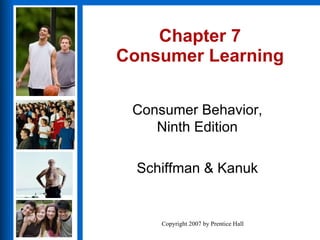Chapter 7 Consumer Learning
•Transferir como PPT, PDF•
123 gostaram•51,858 visualizações
Consumer Behavior Ninth Edition Schiffman and Kanuk
Denunciar
Compartilhar
Denunciar
Compartilhar

Recomendados
Recomendados
Mais conteúdo relacionado
Mais procurados
Mais procurados (20)
Personality and self concept- Studying Consumer Behaviour 

Personality and self concept- Studying Consumer Behaviour
Levels of Consumer Decision making & A model of Consumer Decision making in C...

Levels of Consumer Decision making & A model of Consumer Decision making in C...
Destaque (7)
Learning theories and their implications on educational technology

Learning theories and their implications on educational technology
Semelhante a Chapter 7 Consumer Learning
Semelhante a Chapter 7 Consumer Learning (20)
Consumer Learning the meaning and types in consumer behaviour

Consumer Learning the meaning and types in consumer behaviour
Mais de Avinash Kumar
Mais de Avinash Kumar (20)
Chapter 7 Consumer Learning
- 1. Chapter 7 Consumer Learning
- 6. weblink
- 9. Classical Conditioning A behavioral learning theory according to which a stimulus is paired with another stimulus that elicits a known response that serves to produce the same response when used alone.
- 10. Models of Classical Conditioning Figure 7-2a
- 11. Figure 7-2b
- 12. We now associate this product with strength.
- 17. Instrumental (Operant) Conditioning A behavioral theory of learning based on a trial-and-error process, with habits forced as the result of positive experiences (reinforcement) resulting from certain responses or behaviors.
- 19. A Model of Instrumental Conditioning Figure 7-10
- 21. Observational Learning A process by which individuals observe how others behave in response to certain stimuli and reinforcements. Also known as modeling or vicarious learning.
- 22. The consumer observes a positive response by two teens.
- 23. Cognitive Learning Theory Holds that the kind of learning most characteristic of human beings is problem solving, which enables individuals to gain some control over their environment.
- 25. Information Processing and Memory Stores - Figure 7.14
- 29. Table 7.1 Models of Cognitive Learning Attention Cognitive Action Conative Purchase Postpurchase Evaluation Trial Adoption Decision Confirmation Affective Evaluation Interest Evaluation Persuasion Knowledge Awareness Awareness Knowledge Interest Desire Sequential Stages of Processing Innovation Adoption Model Decision-Making Model Tricompetent Model Innovation Decision Process Promotional Model
- 33. Peripheral route to persuasion
- 36. Harley-Davidson Has Strong Brand Loyalty weblink